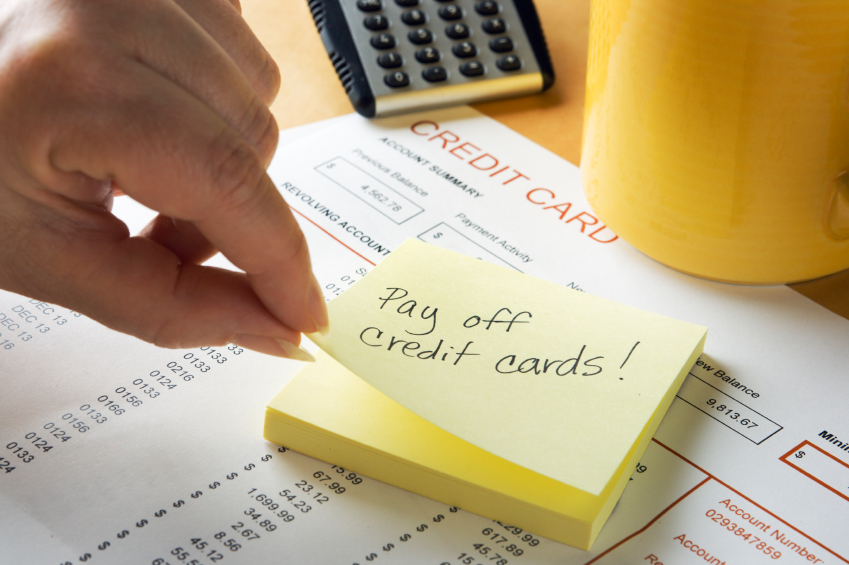By now it should go without saying that being in credit card debt is like plugging a siphon into your bank account. In fact, credit card debt is likely the most expensive debt you’ll ever carry with an industry average 15 percent interest rate. So, what is the best way to get out of credit card debt?
[cta button=”text for button” image=”http://override-default-image-url” link=”http://override-default-link/”]Get your free monthly credit score–no credit card required![/cta]
The good news is that even if you can’t afford to write a big check to pay it off, there are other effective ways to get out of credit card debt.
Using a Personal Loan
A personal loan is an unsecured installment loan. If you’ve got good credit it’s not that hard to qualify for personal loans well above $10,000. If you use the funds from a personal loan to pay off credit card debt then your credit scores should shoot through the roof because you’ll be converting score damaging revolving debt into score benign installment debt.
As far as the cost of the installment loan, it’s possible the interest rate will be considerably lower. If you have good credit you can get an installment loan in the low teens, while your credit card debt might be as expensive as the high 20s. Plus installment loans have a much shorter payoff period compared to credit cards.
Using a Balance Transfer
If you’ve got good credit then you’re probably already getting offers for zero percent credit cards. These are tempting, and for good reason. Converting your expensive credit card debt to zero interest credit card debt is a considerable trade off in your favor.
Many of these credit cards allow you to transfer your entire interest accruing balances from other cards AND allow you to make new purchases, all at zero percent interest for some period of time. If you’re disciplined you can use the grace period, normally between 6-12 months, to aggressively attack the balance and get out of the debt.
Using a Debt Management Program
A debt management program (“DMP”) is offered by the member agencies of the National Foundation for Credit Counseling, or NFCC. When you enter into a DMP you commit to making a smaller payment directly to the plan’s administrator who then pays your credit card issuers. In most cases your interest rate is lowered and fees are waived and your payments are considered to be “on time” even if they’re not large enough to make the contractual minimum payment.
A DMP can take several years to pay out, which is why some people don’t complete the plan. But, if you do enter a DMP and make all of your payments then you exit the plan debt free with solid credit reports and scores. And, the best feeling in the world, you actually paid off your obligation without the help of debt settlement companies or bankruptcy attorneys.
Using a HELOC
A HELOC, or a home equity line of credit, is a revolving line of credit secured by equity in your home. That line of credit can be tapped and used for whatever you like; to pay off debt, to buy a car, to pay college tuition, or just to have as an emergency fund. HELOCs are commonly used to pay off credit card debt because the interest is tax deductible and the interest rates are relatively low.
The danger when using a HELOC is what happens if you go into default. Because a HELOC is secured by the equity in your home the bank can foreclose on your house if you don’t pay back the loan. For some people that’s far too much of a gamble just to pay off a little credit card debt.
John Ulzheimer is a nationally recognized expert on credit reporting, credit scoring and identity theft and is the only recognized credit expert who actually comes from the credit industry. He is twice FCRA certified by the credit industry’s trade association and has been an expert witness in over 125 credit related cases to date. Since 2004 John has been interviewed and published over 2,000 times on the topics of personal finance and consumer credit.
More on Managing Credit & Credit Scores from Credit Sesame:
- What is Revolving Utilization and What Does It Have to Do With My Credit Score?
- 0% Balance Transfers: The Secret to Getting Out of Credit Card Debt
- Does Credit Counseling Hurt My Credit Score?
- What’s a Good Credit Score? Here’s the Real Answer
- 5 Secrets to Earning Great Credit Scores
- The High Cost of Having a Bad Credit Score





















